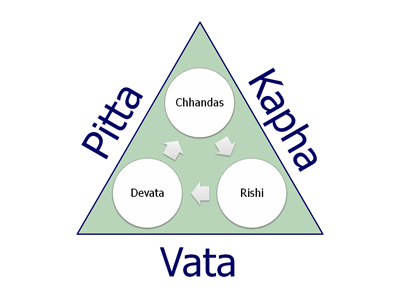What Diet is Right for Me?
Eat Your Way to Balance

Everyone who is health-conscious seemingly wants to know what to eat. Diet clearly has a powerful effect on our physiology. The Ayurvedic texts suggest that, without proper diet, herbal therapy is not effective; and with proper diet, therapy is often not necessary. But there is more to the story. Essentially, our body is a machine for creating consciousness from food. To learn more about this, see Food and Health and Ayurveda Overview.
Since digestion is the mechanism which converts food to bodily tissues that work together to support brain activity, the power of digestion also demands consideration. If your digestion is disturbed, you'll want to fix that problem quickly before it diminishes your quality of life. Start with the Digestion Assessment.
Moreover, when and how we eat makes a huge difference. Wholesome food is necessary but not sufficient. What is wholesome and balancing for one person, might cause problems for another. Even wholesome food consumed inappropriately can become poison (see my blog: Healthful Eating Habits Don’t Create Toxins). These toxic products of faulty digestion are known as Ama (literally uncooked food). To see if Ama might be a problem for you, do the Ama Assessment.
Start with General Principles
For these reasons, it's optimum to examine your health habits in relation to Ideal Daily Routine. Also review General Principles for Health, Vitality and Longevity, which include important basic information about eating habits, meals and food selection. This will get you 80% of the way to a healthful diet.
The other 20% of what you might want to know is likely to be more challenging. Don't feel bad. Selection of proper diet is one of the most delicate judgments in the consultation process. It's even more complicated when more than one Dosha is disturbed.
The following table will give you an idea of the ideal propotions of general food choices for balancing the Doshas. For food-specific detail, see the Dosha-specific diets.
| Food Group | Vata | Pitta | Kapha |
|---|---|---|---|
| Grains | ++++ | +++ | ++ |
| Greens | +++ | +++ | ++++ |
| Beans | + | +++ | ++++ |
| Fruit | +++ | +++ | + |
| Milk | +++ | +++ | + |
| Lassi | +++ | +++ | +++ |
| Nuts | ++ | + | - |
| Seeds | ++ | ++ | - |
| Oil/Ghee | +++ | ++ | + |
Learn About the Doshas and Assess Your Situation
If you're looking to achieve and maintain proper balance of your own unique combination of Doshas, you first need to understand the qualities of the three Doshas and how they vary with the cycles of Nature (see Doshas). You also need to have a reasonable idea of your own Prakriti (Nature) and Vikriti (imbalances). Furthermore, you'll do well to assess your current habits against general Ayurvedic principles.
Here's the general formula for what needs to be considered:
- Where obesity, Ama or digestive disturbances prevail, follow the light version of the for the appropriate Dosha or the General Purification Diet.
- Address significant Dosha imbalances
- Otherwise, see the chart in the sidebar to select a diet to balance the effects of season according to your Doshas:
- In winter, chose the Vata Pacifying Diet or simply seek to get an overall balance of the six tastes (Balanced Diet)
- If you have the Dosha of the season, balance it
- Else if you have Vata Dosha, balance it
| Prakriti | Kapha | Pitta | Vata |
|---|---|---|---|
| Vata | V | V | V |
| Pitta | P | P | B |
| Kapha | K | K | B |
| Vata-Pitta | V | P | V |
| Vata-Kapha | K | V | V |
| Pitta-Kapha | K | P | B |
| Tridosha | K | P | V |
V = Vata Pacifying Diet
P = Pitta Pacifying Diet
K = Kapha Pacifying Diet
B = Balanced Diet